About the EE3 Symposium
Symposium Schedule, .pdf
Keynote Speaker
About the EE3 Symposium
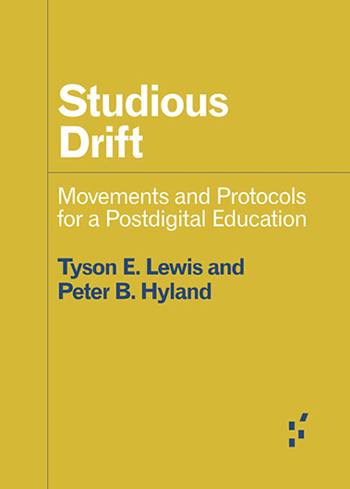 The Onstead Institute, the Department of Art Education and the College of Visual Arts and Design present Education as Experimentation 3, a symposium on Oct. 21-22, 2022, 8 a.m.–5 p.m., in the UNT Art Building, Room 187.
The Onstead Institute, the Department of Art Education and the College of Visual Arts and Design present Education as Experimentation 3, a symposium on Oct. 21-22, 2022, 8 a.m.–5 p.m., in the UNT Art Building, Room 187.
You are invited! To attend, please contact the Onstead Institute at cvad.onstead@unt.edu.
Artists, designers, educators and scholars are invited to gather for panel discussions and experimental protocols involving attendees actively exploring educational possibilities.
The symposium is presented on the occasion of the release of the book "Studious Drift: Movements and Protocols for a Postdigital Education" by Tyson E. Lewis, professor of Art Education, and Peter B. Hyland, director of the Onstead Institute. Proceedings will feature keynote speaker Erin Manning, founder of Sense Lab, and include critical responses to the book and experimental protocols arranged by invited guests from the following institutions.
- Aalto University, Espoo, Finland
- Arizona State University, Tempe, Ariz.
- Columbia University, New York City
- KU Leuven, Leuven, Belgium
- Stanford University, Stanford, Calif.
- University of Cambridge, Cambridge, England
- University of North Texas, Denton, Texas
Keynote Speaker
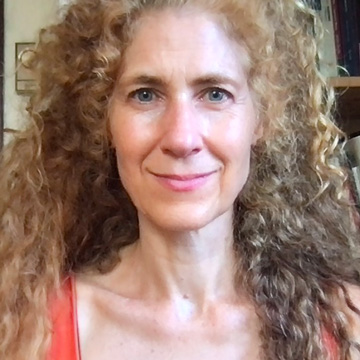 Erin Manning, Ph.D., studies in the interstices of philosophy, aesthetics and politics, always concerned about alter-pedagogical and alter-economic practices. Pedagogical experiments are central to her work, some of which occur at Concordia University, Montreal, Canada, where she is a research chair in Speculative Pragmatism, Art and Pedagogy in the Faculty of Fine Arts.
Erin Manning, Ph.D., studies in the interstices of philosophy, aesthetics and politics, always concerned about alter-pedagogical and alter-economic practices. Pedagogical experiments are central to her work, some of which occur at Concordia University, Montreal, Canada, where she is a research chair in Speculative Pragmatism, Art and Pedagogy in the Faculty of Fine Arts.
Recent monographs include "The Minor Gesture" (Duke 2016), "For a Pragmatics of the Useless" (2020), and "Out of the Clear," (forthcoming, minor compositions). Her artwork is textile-based and relationally-oriented, often participatory. She is interested in the detail of material complexity, what reveals itself to perception sideways, and the quality of a textural engagement with life. Her recent work often plays synesthetically with touch in acknowledgment and experimentation with the ProTactile movement for DeafBlind culture and language. Tactile propositions include large-scale hangings produced with various tools including tufting, hooking, knotting and weaving. 3e is her current research's main direction: exploring the transversality of the three ecologies, the social, the environmental and the conceptual. An iteration of 3e is a land-based project north of Montreal where living and learning are in experimentation. Legacies of SenseLab infuse the project, particularly the question of how collectivity is crafted in a more-than-human encounter with worlds in the making.
ProTactile is described by Helen Keller Services for the Blind as "much more than a system of touch signals," instead "a philosophy and a movement which focuses on autonomy and equality for people who are deaf-blind."
About "Studious Drift"
What kind of university is possible when digital tools are not taken for granted, but hacked for a more experimental future?
Studious Drift revives the relationship between studying and the studio's generative space to advance educational experimentation in a world where digital tools have become a permanent part of education. It reveals how a studio is a space-time machine capable of traveling beyond the limits of conventional online learning to redefine education as interdisciplinary, experimental, public study.
Symposium Panelists
Cala Coats
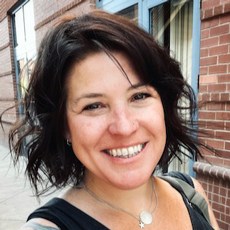 Cala Coats, Ph.D., assistant professor of Art Education and associate director of Research and Education in the School of Art at Arizona State University, Tempe, Ariz. Her research focuses on intersections of ethics and aesthetics, emphasizing nomadic inquiry, public pedagogy, and socially engaged art. Coats has published in a range of academic journals, as well as chapters in "What Happens at the Intersection of Teaching and Conceptual Art" (in press); "The Routledge Companion to Decolonizing Art, Craft, and Visual Culture Education" (in press), "Makers, Crafters, Educators: Working for Cultural Change," and "Bridging Communities Through Socially Engaged Art, and Pedagogies in the Flesh: Case Studies on the Embodiment of Sociocultural Differences in Education." In 2021, she was awarded Pacific Region Higher Education Art Educator Award from the National Art Education Association. She is currently the senior co-editor of "The Journal of Cultural Research in Art Education" and co-creator of Designing the Pluriversity. Contact email.
Cala Coats, Ph.D., assistant professor of Art Education and associate director of Research and Education in the School of Art at Arizona State University, Tempe, Ariz. Her research focuses on intersections of ethics and aesthetics, emphasizing nomadic inquiry, public pedagogy, and socially engaged art. Coats has published in a range of academic journals, as well as chapters in "What Happens at the Intersection of Teaching and Conceptual Art" (in press); "The Routledge Companion to Decolonizing Art, Craft, and Visual Culture Education" (in press), "Makers, Crafters, Educators: Working for Cultural Change," and "Bridging Communities Through Socially Engaged Art, and Pedagogies in the Flesh: Case Studies on the Embodiment of Sociocultural Differences in Education." In 2021, she was awarded Pacific Region Higher Education Art Educator Award from the National Art Education Association. She is currently the senior co-editor of "The Journal of Cultural Research in Art Education" and co-creator of Designing the Pluriversity. Contact email.
Tyler Denmead
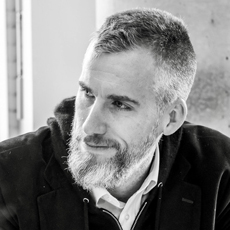 Tyler Denmead, Ph.D., teaches in the Faculty of Education and Queens' College at the University of Cambridge, Cambridge, England. He is the author of "The Creative Underclass: Youth, Race, and the Gentrifying City" (Duke University Press, 2019) and the founding executive director of New Urban Arts. He is currently working on a book project that engages critically with anti-racist reading practices. Contact email.
Tyler Denmead, Ph.D., teaches in the Faculty of Education and Queens' College at the University of Cambridge, Cambridge, England. He is the author of "The Creative Underclass: Youth, Race, and the Gentrifying City" (Duke University Press, 2019) and the founding executive director of New Urban Arts. He is currently working on a book project that engages critically with anti-racist reading practices. Contact email.
Antero Garcia
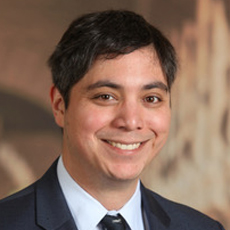 Antero Garcia, Ph.D., is an associate professor in the Graduate School of Education at Stanford University, Stanford, Calif. Before completing his doctoral degree, Antero was an English teacher at a public high school in South Central Los Angeles. His research explores the possibilities of speculative imagination and healing in educational research. Based on his research, Antero co-designed the Critical Design and Gaming School STEM Magnet, a public high school in Los Angeles. He has authored or edited more than a dozen books about the possibilities of literacy, play and civics in transforming schooling in America. Contact email.
Antero Garcia, Ph.D., is an associate professor in the Graduate School of Education at Stanford University, Stanford, Calif. Before completing his doctoral degree, Antero was an English teacher at a public high school in South Central Los Angeles. His research explores the possibilities of speculative imagination and healing in educational research. Based on his research, Antero co-designed the Critical Design and Gaming School STEM Magnet, a public high school in Los Angeles. He has authored or edited more than a dozen books about the possibilities of literacy, play and civics in transforming schooling in America. Contact email.
Emma Hovi
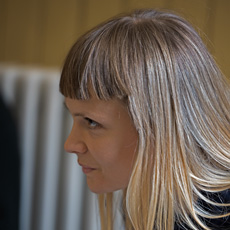 Emma Hovi (b. 1989) from Vasa, Finland, is an artist and art educator with a background in continental philosophy. She received her formal education in Berlin, Montréal, Vienna and Helsinki, where she currently works and lives. Her experience as an art educator spans her work in public schools, museums and other cultural institutions. She has worked with the most established Finnish contemporary art museums, where she has been part of artist collaborations and created workshops for various audiences including differently-abled youth. She is part of the staff at the art center Annantalo in Helsinki, where she teaches visual arts to children and youth, and works as a guide and workshop facilitator at Espoo Museum of Modern Art, EMMA.
Emma Hovi (b. 1989) from Vasa, Finland, is an artist and art educator with a background in continental philosophy. She received her formal education in Berlin, Montréal, Vienna and Helsinki, where she currently works and lives. Her experience as an art educator spans her work in public schools, museums and other cultural institutions. She has worked with the most established Finnish contemporary art museums, where she has been part of artist collaborations and created workshops for various audiences including differently-abled youth. She is part of the staff at the art center Annantalo in Helsinki, where she teaches visual arts to children and youth, and works as a guide and workshop facilitator at Espoo Museum of Modern Art, EMMA.
Hovi's artistic practices are based on drawing, photography, performance, and text. She is interested in feminine-coded labor, boredom, and performativity regarding social belonging. Her artwork has been selected for group exhibitions in Finland, Switzerland, Austria, Sweden and Hong Kong, while her essays and illustrations have been published in various outlets, including Ante and NO NIIN Magazine. Currently, she is working on her upcoming solo exhibition in the Pesula Galleria housed in the former Nikkilä Mental Hospital in Sipoo, Finland. The exhibition is generously supported by the Finnish Cultural Foundation and the Swedish-Finnish Cultural Foundation.
Since 2020, Hovi has co-organized Social Choreography Lab Helsinki, a collaborative artistic experiment at the intersection of movement and political life that is based at the Eskus Performance Center in Helsinki. She also has served on the feminist cultural journal Astra board and facilitated writing workshops internationally. Contact email.
Peter Hyland
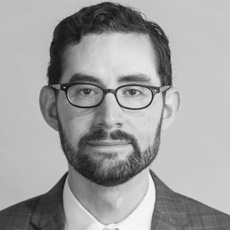 Peter B. Hyland is director of the Onstead Institute for Education in the Visual Arts and Design at the University of North Texas. He is co-author, with Tyson E. Lewis, of the book "Studious Drift: Movements and Protocols for a Postdigital Education" and various articles. He is also the author of the poetry collection "Out Loud" and has published creative work in journals including "Conduit," "Green Mountains Review," "New England Review," "Ploughshares," and elsewhere. Contact email.
Peter B. Hyland is director of the Onstead Institute for Education in the Visual Arts and Design at the University of North Texas. He is co-author, with Tyson E. Lewis, of the book "Studious Drift: Movements and Protocols for a Postdigital Education" and various articles. He is also the author of the poetry collection "Out Loud" and has published creative work in journals including "Conduit," "Green Mountains Review," "New England Review," "Ploughshares," and elsewhere. Contact email.
Jon Irigoyen
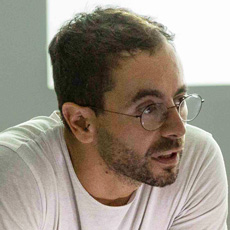 Jon Irigoyen (b. 1978) from Bilbao, Spain, is a Basque-Spanish artist, storyteller and researcher. Since 1996 he has lived and worked in different cities such as Madrid and Barcelona, Spain, Bristol, England, and Helsinki, where he currently resides. Irigoyen has been a board member and organizer of the Festival Pixelache Helsinki since 2009, and a member of the visual artists' association MUU since 2017. He is one of the founding members of the Cluster for Critical Artistic Research, CCARe, hosted by Aalto University, Espoo, Finland, since 2019. Currently, Irigoyen serves on the board of the performing arts association Esitystaiteen Seura based at ESKUS Performance Centre, Helsinki.
Jon Irigoyen (b. 1978) from Bilbao, Spain, is a Basque-Spanish artist, storyteller and researcher. Since 1996 he has lived and worked in different cities such as Madrid and Barcelona, Spain, Bristol, England, and Helsinki, where he currently resides. Irigoyen has been a board member and organizer of the Festival Pixelache Helsinki since 2009, and a member of the visual artists' association MUU since 2017. He is one of the founding members of the Cluster for Critical Artistic Research, CCARe, hosted by Aalto University, Espoo, Finland, since 2019. Currently, Irigoyen serves on the board of the performing arts association Esitystaiteen Seura based at ESKUS Performance Centre, Helsinki.
His research interests and artistic projects span the intersecting relationships between embodiment and political life, autonomy, celebration and ritual. Recently his work has focused on the political and social power of movement through the concept of Social Choreography, which forms the backbone of his current doctoral research at Aalto University, Finland. Since 2020, Irigoyen acts as the director of Social Choreography Lab Helsinki, a collaborative artistic experiment at the intersection of movement and political life.
Irigoyen is currently developing his doctorate in artistic research at Aalto University under the supervision of Bassam El Baroni, associate professor in Curating and Mediating Art. The artist and choreographer Michael Klien, associate professor at Duke University, Durham, N.C., is his current advisor. Previously, his research was under the supervision of Italian philosopher Franco Berardi, Bifo. Contact email.
Tyson Lewis
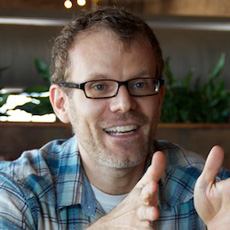 Tyson E. Lewis, Ph.D., is a professor of Art Education at the University of North Texas, Denton, Texas, where he teaches courses in critical theory, aesthetic philosophy, philosophy for children, and critical phenomenology. His essays have appeared in various interdisciplinary journals such as Symploke, Angelaki, Cultural Critique, Thesis Eleven, Educational Theory, Studies in Art Education, and Curriculum Inquiry. He is also the author of many books, most recently "Walter Benjamin’s Antifascist Education: From Riddles to Radio" (SUNY Press) and "Studious Drift: Movements and Protocols for a Postdigital Education" (University of Minnesota Press) with Peter Hyland. Contact email.
Tyson E. Lewis, Ph.D., is a professor of Art Education at the University of North Texas, Denton, Texas, where he teaches courses in critical theory, aesthetic philosophy, philosophy for children, and critical phenomenology. His essays have appeared in various interdisciplinary journals such as Symploke, Angelaki, Cultural Critique, Thesis Eleven, Educational Theory, Studies in Art Education, and Curriculum Inquiry. He is also the author of many books, most recently "Walter Benjamin’s Antifascist Education: From Riddles to Radio" (SUNY Press) and "Studious Drift: Movements and Protocols for a Postdigital Education" (University of Minnesota Press) with Peter Hyland. Contact email.
Christopher Moffett
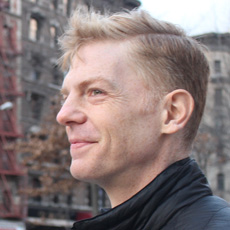 Chris Moffett, Ph.D., is a scholar working across the fields of philosophy, education, art and technology. His current research centers on embodied practice in education, play and diagramming. He is a research scholar at the Digital Futures Institute, Teachers College, Columbia University, New York City. Contact email.
Chris Moffett, Ph.D., is a scholar working across the fields of philosophy, education, art and technology. His current research centers on embodied practice in education, play and diagramming. He is a research scholar at the Digital Futures Institute, Teachers College, Columbia University, New York City. Contact email.
Poli Nemkova
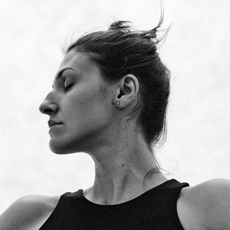 Poli Nemkova is a computer science Ph.D. student and artificial intelligence researcher at UNT’s College of Engineering. Previously she worked at an art gallery in Russia where she explored interactivity in art spaces. She is passionate about intelligence in all forms, art as a tool of resistance, and language. Her main work combines natural language processing for human rights. Contact email.
Poli Nemkova is a computer science Ph.D. student and artificial intelligence researcher at UNT’s College of Engineering. Previously she worked at an art gallery in Russia where she explored interactivity in art spaces. She is passionate about intelligence in all forms, art as a tool of resistance, and language. Her main work combines natural language processing for human rights. Contact email.
Manisha Sharma
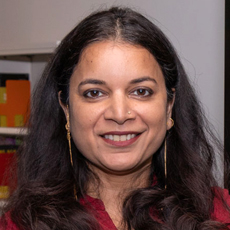 Manisha Sharma, Ph.D., is an arts educator, artist, and researcher. Her work examines how perceptions of culture and community are formed, internalized, and acted out within various communities, through the production and consumption of art and visual culture artifacts. She is a professor and Chair of Art Education at the University of North Texas, Denton, Texas. She is the current editor of "The Journal of Social Theory in Art Education," the co-editor of the Routledge publication "Makers, Crafters, Educators: Working for Social Change" (2018) and the forthcoming book titled "Routledge Companion to Decolonizing Art, Craft, and Visual Culture Education." Contact email.
Manisha Sharma, Ph.D., is an arts educator, artist, and researcher. Her work examines how perceptions of culture and community are formed, internalized, and acted out within various communities, through the production and consumption of art and visual culture artifacts. She is a professor and Chair of Art Education at the University of North Texas, Denton, Texas. She is the current editor of "The Journal of Social Theory in Art Education," the co-editor of the Routledge publication "Makers, Crafters, Educators: Working for Social Change" (2018) and the forthcoming book titled "Routledge Companion to Decolonizing Art, Craft, and Visual Culture Education." Contact email.
Omari Souza
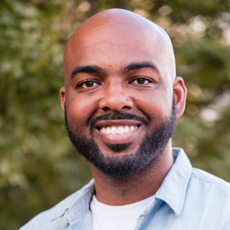 Omari Souza is a designer and educator. Omari Souza was raised in the Bronx, a first-generation American of Jamaican descent. He is currently an assistant professor in the CVAD Department of Design's Communication Design program at the University of North Texas, Denton, Texas, and the founder and organizer of the State of Black Design Conference. His past employers include "VIBE" magazine, Buffalo News, CBS Radio, and Case Western Reserve University in Cleveland, Ohio. Contact email.
Omari Souza is a designer and educator. Omari Souza was raised in the Bronx, a first-generation American of Jamaican descent. He is currently an assistant professor in the CVAD Department of Design's Communication Design program at the University of North Texas, Denton, Texas, and the founder and organizer of the State of Black Design Conference. His past employers include "VIBE" magazine, Buffalo News, CBS Radio, and Case Western Reserve University in Cleveland, Ohio. Contact email.
Juuso Tervo
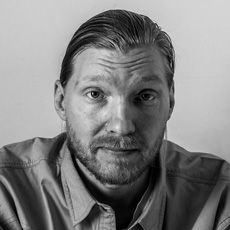 Juuso Tervo, he/him, Ph.D., is a Senior University Lecturer and the Head of the Master’s Program in Nordic Visual Studies and Art Education at Aalto University School of Arts, Design and Architecture, Espoo, Finland. His research and writing combine historical, theoretical, and political inquiries in art and education, drawing from fields such as literary theory, poetics, theology, philosophy of education, and philosophy of history. In 2014, Tervo received his doctoral degree in arts administration, education and policy from The Ohio State University, Columbus, Ohio. Contact email.
Juuso Tervo, he/him, Ph.D., is a Senior University Lecturer and the Head of the Master’s Program in Nordic Visual Studies and Art Education at Aalto University School of Arts, Design and Architecture, Espoo, Finland. His research and writing combine historical, theoretical, and political inquiries in art and education, drawing from fields such as literary theory, poetics, theology, philosophy of education, and philosophy of history. In 2014, Tervo received his doctoral degree in arts administration, education and policy from The Ohio State University, Columbus, Ohio. Contact email.
James Thurman
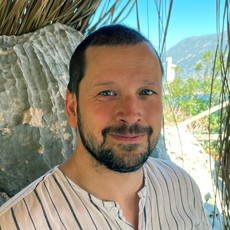 James Thurman is an associate professor of studio art in metalsmithing and jewelry at UNT’s College of Visual Arts and Design. A highly active studio artist for more than 25 years, he is well-known for Thurmanite, a recycled paper and bio-resin composite material that he developed and trademarked. The major goal of his research and artworks is to foster creative problem-solving in everyone’s daily lives with an emphasis on environmental impact and improvement. A two-time Fulbright Specialist Scholar, Thurman regularly exhibits and lectures internationally to further advance his research agenda. He believes each of his artworks becomes a distillation of playful problem-solving, encouraging and inspiring others to open themselves to the joys of passionate creativity. Contact email.
James Thurman is an associate professor of studio art in metalsmithing and jewelry at UNT’s College of Visual Arts and Design. A highly active studio artist for more than 25 years, he is well-known for Thurmanite, a recycled paper and bio-resin composite material that he developed and trademarked. The major goal of his research and artworks is to foster creative problem-solving in everyone’s daily lives with an emphasis on environmental impact and improvement. A two-time Fulbright Specialist Scholar, Thurman regularly exhibits and lectures internationally to further advance his research agenda. He believes each of his artworks becomes a distillation of playful problem-solving, encouraging and inspiring others to open themselves to the joys of passionate creativity. Contact email.
Nasrin Tork
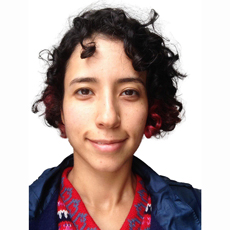 Nasrin Tork is a multidisciplinary artist, curator, and researcher, pursuing a Ph.D. in the philosophy of art education and minoring in art museum education at the UNT College of Visual Arts and Design, Denton, Texas. Tork obtained a B.A. in Sculpture from Tehran Art University, Tehran, Iran. She continued her graduate studies in fine arts, installation art and later curatorial studies at the Royal Academy of Fine Arts, KASK, School of Arts, of University College Ghent, Belgium. Nasrin's research focuses on the socio-political question of agency and its episodic temporalities at the intersection of arts and education. Tork has co-curated several shows in Belgium and exhibited her artworks in museums and galleries worldwide, such as in Iran, Belgium, The Netherlands, Sweden, Italy and the U.S. Contact email.
Nasrin Tork is a multidisciplinary artist, curator, and researcher, pursuing a Ph.D. in the philosophy of art education and minoring in art museum education at the UNT College of Visual Arts and Design, Denton, Texas. Tork obtained a B.A. in Sculpture from Tehran Art University, Tehran, Iran. She continued her graduate studies in fine arts, installation art and later curatorial studies at the Royal Academy of Fine Arts, KASK, School of Arts, of University College Ghent, Belgium. Nasrin's research focuses on the socio-political question of agency and its episodic temporalities at the intersection of arts and education. Tork has co-curated several shows in Belgium and exhibited her artworks in museums and galleries worldwide, such as in Iran, Belgium, The Netherlands, Sweden, Italy and the U.S. Contact email.
Nancy Vansieleghem
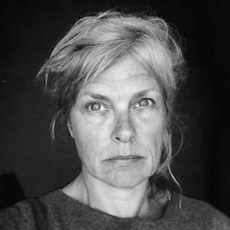 Nancy Vansieleghem is a lecturer in the educational master's degree in arts program at the LUCA School of Arts, Ghent, Belgium. She teaches and does research in areas of philosophy of education, aesthetic education and radical pedagogy. She is interested in the mutated landscape — due to digitalization, migration and climate change — in which the arts and education operate, and the urgency to reconsider new forms such as tactics, formats and tools, to address how this mutation affects education and its relation to the arts. She coordinates the research cluster Art, Pedagogy and Society which operates as a collective of individual Ph.D. researchers and artistic projects. Vansieleghem supervises Ph.D. research that deals with the topics of emancipation, dwelling, film fiction, studio and childhood in resonance with changing conditions. Currently, she published with Volkmar Muhleis the book "Artuarium, The Grammar of Art School." Contact email.
Nancy Vansieleghem is a lecturer in the educational master's degree in arts program at the LUCA School of Arts, Ghent, Belgium. She teaches and does research in areas of philosophy of education, aesthetic education and radical pedagogy. She is interested in the mutated landscape — due to digitalization, migration and climate change — in which the arts and education operate, and the urgency to reconsider new forms such as tactics, formats and tools, to address how this mutation affects education and its relation to the arts. She coordinates the research cluster Art, Pedagogy and Society which operates as a collective of individual Ph.D. researchers and artistic projects. Vansieleghem supervises Ph.D. research that deals with the topics of emancipation, dwelling, film fiction, studio and childhood in resonance with changing conditions. Currently, she published with Volkmar Muhleis the book "Artuarium, The Grammar of Art School." Contact email.
Joris Vlieghe
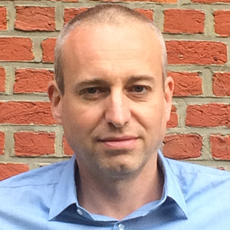 Joris Vlieghe is an associate professor of philosophy and theory of education at KU Leuven, Leuven, Belgium, with Naomi Hodgson and Piotr Zamojski. He recently published a "Manifesto for a Post-critical Pedagogy" (Punctum Books 2018) and "Towards an Ontology of Teaching" with Zamojski. Thing-centered pedagogy, affirmation and love for the world (Springer 2019). In line with his interests in the role of the teacher and the educational meaning of studying, Vilieghe's current research explores how study practices can respond to the issue of how to live well with the world’s human and non-human inhabitants in times of ecological catastrophe. He is also interested in the impact of digital technologies on education and the future of "the school," especially when a culture of "the screen" is rapidly substituted for a culture of the book. Contact email.
Joris Vlieghe is an associate professor of philosophy and theory of education at KU Leuven, Leuven, Belgium, with Naomi Hodgson and Piotr Zamojski. He recently published a "Manifesto for a Post-critical Pedagogy" (Punctum Books 2018) and "Towards an Ontology of Teaching" with Zamojski. Thing-centered pedagogy, affirmation and love for the world (Springer 2019). In line with his interests in the role of the teacher and the educational meaning of studying, Vilieghe's current research explores how study practices can respond to the issue of how to live well with the world’s human and non-human inhabitants in times of ecological catastrophe. He is also interested in the impact of digital technologies on education and the future of "the school," especially when a culture of "the screen" is rapidly substituted for a culture of the book. Contact email.
Note: Should you need reasonable accommodation due to a disability to fully participate in a CVAD event, please contact the CVAD Dean's Office, cvad@unt.edu, 940-565-4001. For voice access, dial 1-800-RELAYTX (735-2989). Please make the request as soon as possible to allow sufficient time to arrange the accommodation.
